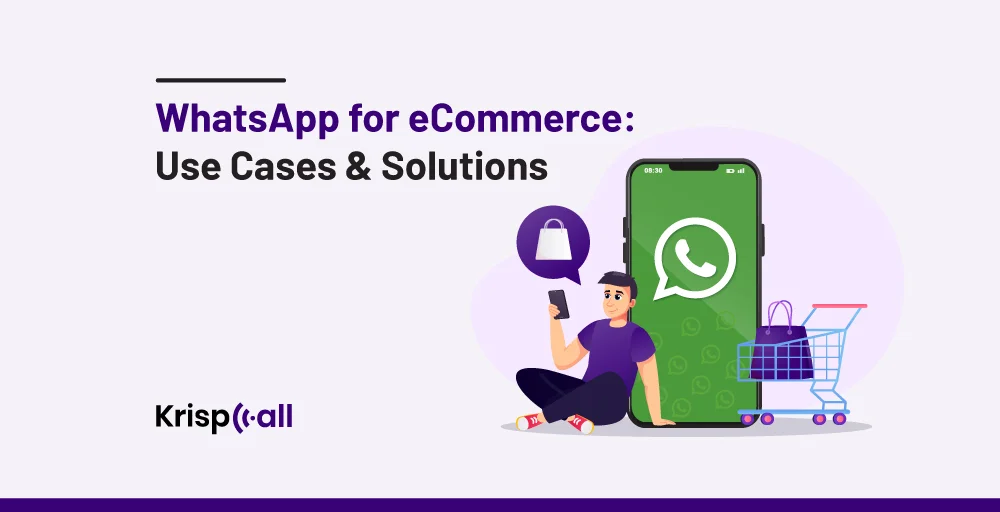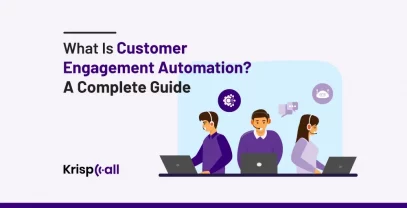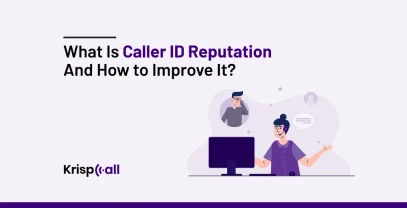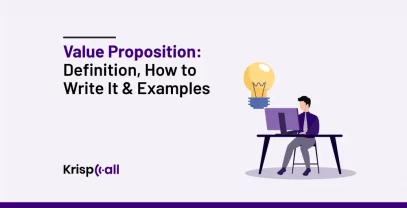Are you having trouble developing creative methods to interact with your online shoppers? 😱 Many companies struggle to stay in touch with their clients directly and personally, which results in lost sales opportunities and lower client satisfaction.
Envision 🤔a platform that allows you to interact with clients immediately, respond to their questions, and offer tailored purchasing experiences. With real-time conversations that increase consumer engagement and promote purchases, WhatsApp is ideal for eCommerce enterprises✅.
Incorporating WhatsApp into your eCommerce system may improve client interactions, speed up order tracking, and streamline customer support.
Here, This blog will explore WhatsApp e-commerce and how utilizing WhatsApp may revolutionize your e-commerce operations with its 22 use cases for e-commerce.
🔑 KEY HIGHLIGHTS
- WhatsApp e-commerce is the use of WhatsApp to enable online sales and purchases, giving companies direct client interaction.
- An e-commerce store must have WhatsApp to offer immediate customer support and engagement.
- WhatsApp e-commerce functions by allowing companies to communicate with clients using the WhatsApp messaging app.
- Launching products with user-initiated product development and finding products in automated mode are some of WhatsApp’s top use cases for e-commerce.
What Is WhatsApp Ecommerce?
WhatsApp e-commerce is a platform that uses WhatsApp to enable online sales and purchases, giving companies direct client interaction. It uses messaging to provide product details, respond to consumer questions, and easily handle orders.
Automating customer interactions through WhatsApp API in eCommerce streamlines procedures such as order confirmations and customer assistance. This increases productivity, shortens response times, and raises client happiness.
Additionally, WhatsApp API increases a company’s reach using a widely used platform that promotes convenience and trust. This may result in stronger client relationships and higher sales.
How Does WhatsApp Ecommerce Work?
WhatsApp eCommerce functions by allowing companies to communicate with clients using the WhatsApp messaging app. Customers may browse products, ask queries, and place orders during the chat.
Similarly, Companies may send order updates, automate responses, and offer customer assistance by utilizing capabilities like WhatsApp Business API. This interactive, real-time method simplifies communication while improving the buying experience.
Why Do You Need WhatsApp For An Ecommerce Store?
An e-commerce store must have WhatsApp to offer immediate customer support and engagement. Businesses can respond to inquiries promptly, increasing client satisfaction and trust.
Basically, users find WhatsApp a comfortable and convenient tool due to its wide availability. When integrated into an eCommerce store, it can increase accessibility and sales.
Moreover, WhatsApp simplifies order administration by providing real-time information and confirmations. Customers are kept informed throughout their purchasing process, and transparency is enhanced.
Top 22 Uses Cases Of WhatsApp For E-commerce
Here are the top 22 use cases of WhatsApp for e-commerce:
1. Launch Product With User-Initiated Product Development
For e-commerce, user-initiated product development through WhatsApp entails incorporating clients directly in the creation process. Businesses can collect ideas, preferences, and feedback through conversations or groups to ensure the finished product meets the user’s expectations.
Similarly, this strategy uses early user insights to improve their happiness and product relevance. Active interaction fosters consumer loyalty and trust, promoting better product launches and long-term company growth.
2. Find Products In Automated Mode
WhatsApp can be used in e-commerce to find products automatically by installing chatbots that promptly discover and show you certain things. Managing numerous inquiries simultaneously improves operational efficiency, increases the shopping process, and requires less work from you or the client.
In addition to retrieving current product information and understanding natural language questions, these automated systems can provide customized recommendations based on past interactions and your preferences.
3. Offer Instant Resolutions With List Messages And Quick Reply Buttons
Businesses utilizing WhatsApp for e-commerce can provide immediate solutions by using list messages for order tracking and FAQs. Quick reply buttons can help companies respond to your queries quickly.
Additionally, this strategy increases customer service effectiveness and improves your happiness and the whole purchasing experience through faster response times and more efficient communication.
4. Warm Up With Personalized Interactions And Build Rapport
Businesses may personalize interactions by offering exclusive discounts and customized product recommendations with WhatsApp for eCommerce, increasing consumer loyalty. This strategy humanizes the purchasing experience by giving you a sense of worth and comprehension.
Similarly, Businesses can improve average client happiness and retention by interacting with you on WhatsApp and developing a connection through customized messages and prompt answers to questions.
5. Give A Better Experience With Exclusive Pre-Access
By providing limited early access to the introduction of new products or sales events, WhatsApp for e-commerce improves the user experience. Companies can set up particular groups and broadcasts to notify you or devoted clients first, giving a feeling of importance and privacy.
Additionally, this tactic increases client involvement and loyalty while generating anticipation and excitement. Through early access promotions and specific communication, businesses may enhance their client base interactions and increase sales by utilizing WhatsApp for exclusive pre-access.
6. Enhance Brand Perception With WhatsApp Chatbots
WhatsApp Chatbots improve consumers’ perception of e-commerce brands by offering immediate customer service, responding to frequently asked questions, and ensuring smooth transactions.
In addition, these chatbots can perform various duties, including order processing, product information, and quick customer service. This automation will help you see the brand more favorably since it guarantees accurate and consistent communication while reducing response times.
7. Retain Customers With Post-Purchase Support
WhatsApp for e-commerce provides post-purchase services, including order monitoring, delivery notifications, and product issue resolution to help businesses keep clients. Through WhatsApp, companies can offer individualized support directly to customers.
When customers value the convenience of obtaining prompt information and answers to their questions, this strategy fosters trust and loyalty. Thus, E-commerce companies using WhatsApp for post-purchase assistance may build enduring relationships, promote repeat business, and increase customer satisfaction.
8. Re-engage & Recover Abandoned Carts
By offering users rewards and targeted reminders, WhatsApp for eCommerce assists in recovering abandoned carts and re-engaging customers. By providing discounts or exclusive promotions, businesses can utilize automated messaging to persuade you to finish their purchases.
Therefore, By addressing possible transaction obstacles and offering prompt support, e-commerce enterprises may efficiently re-engage you and retrieve abandoned carts, increasing sales and enhancing conversion rates.
9. Create FOMO on WhatsApp Status
WhatsApp for eCommerce fosters FOMO (Fear of Missing Out) by showcasing time-limited deals, flash sales, or special promos through status updates. Companies may create a sense of urgency among consumers by using powerful imagery and convincing content, pushing them to quickly take advantage of exclusive offers.
However, This tactic uses WhatsApp’s status features to create a feeling of urgency and privacy that encourages users to take immediate action. E-commerce companies can use FOMO to boost sales, draw attention, and sustain your interest in their goods and promotions by updating the status with engaging content.
10. Prevent RTO With Instant Information
WhatsApp for eCommerce gives you fast access to product specifications, sizing charts, and shipping alternatives, preventing RTO (Return to Origin) situations. Businesses can use WhatsApp to respond quickly to customers’ inquiries, eliminating doubt and guaranteeing proper decision-making before purchase.
In addition, this method increases customers’ happiness by providing openness and clear communication during purchasing. E-commerce companies can reduce return rates, improve operational effectiveness, and foster trust through dependable and prompt service by utilizing WhatsApp for fast information.
11. Deliver Orders Using Live Location
With WhatsApp for eCommerce, orders may be delivered by live location sharing. This allows you to track deliveries correctly by providing their current position. Companies can guarantee dependable and effective order fulfillment by using WhatsApp to request live locations or send tracking links.
However, e-commerce companies can decrease delivery delays, lower your questions, and increase overall satisfaction by offering a dependable and seamless purchasing experience by utilizing real-time locations for order delivery.
12. Plugin Widget And Click-To-Chat From Your Space
WhatsApp for eCommerce influences click-to-chat features and plugin widgets integrated directly into mobile apps or websites. These solutions make engaging with businesses through chats easy, enabling real-time order updates, support requests, and inquiries.
Because these features offer quick and easy access to support, businesses gain from higher engagement with you and conversion rates. E-commerce platforms may improve customer experience, lower bounce rates, and build deeper customer relationships by incorporating plugin widgets & click-to-chat options into their WhatsApp communication channels.
13. Secure Confirmations From Sending Invoices To Payment Transactions
WhatsApp for e-commerce uses encrypted communications and verification procedures to guarantee secure confirmations, including sending invoices to payment transactions. Businesses may safely evaluate and confirm orders by sending bills to users directly through WhatsApp.
Likewise, you may confirm payment details and receive instant confirmations through a direct communication channel, which improves transaction security and trust. E-commerce companies can speed up payment procedures, lower dispute rates, and boost your confidence by utilizing WhatsApp for safe confirmations.
14. Create Product Catalogs To Smooth The Experience
With WhatsApp for eCommerce, you can explore product catalogs immediately within the app, streamlining the purchase experience. Companies can display pricing, photos, and descriptions of their products so that users can quickly browse selections and decide what to buy.
Similarly, This tool allows businesses to connect with customers directly on a frequently used platform, increasing ease and accessibility. E-commerce companies may successfully display their inventory, draw attention to new products or specials, and increase sales by using WhatsApp for product catalogs.
15. Explore A New Journey With The Find My Business Option
You can now identify and engage with businesses directly through WhatsApp for eCommerce, thanks to the addition of the “Find My Business” option. Encouraging ease and accessibility, this feature lets you look for nearby companies, ask questions about goods or services, and get answers immediately.
Since this “Find My Business” option simplifies your interactions and questions, businesses gain visibility and engagement. E-commerce systems that utilize this capability allow for responsive and direct messaging over WhatsApp, increase customer satisfaction, draw in new clients, and foster confidence.
16. Win Over Customers With A WhatsApp Contest
Businesses use contests and interactive games to draw in and keep customers; WhatsApp, for e-commerce, uses this strategy to engage customers. Offering rewards, savings, or special deals, these competitions promote involvement and raise brand exposure while increasing consumer engagement.
In addition, E-commerce companies may boost your engagement and social media visibility by holding WhatsApp competitions, which will help build a brand community. This strategy increases loyalty and sales by increasing consumer interaction, creating excitement, and promoting the company through communicating verbally.
17. Generate Leads And Drive Sales
WhatsApp for e-commerce engages potential customers through direct chatting to produce leads and increase sales. Businesses may use WhatsApp to nurture prospects throughout the sales cycle by starting conversations, offering product details, and making tailored recommendations.
Likewise, By utilizing WhatsApp in lead generation and sales, e-commerce companies may speed up purchasing, swiftly respond to your inquiries, and eventually boost income through efficient customer interaction tactics on the platform.
18. Design The Unboxing Experience
After you get your goods, WhatsApp for eCommerce improves unboxing by providing multimedia content and personalized messages. Businesses can use WhatsApp to express gratitude for purchases, offer product usage instructions, and get input to enhance client experiences.
In addition to adding a personal touch, this method improves your relations by expressing gratitude and guaranteeing product satisfaction. E-commerce organizations may boost brand loyalty, foster social sharing of unpacking experiences, and create memorable moments by utilizing WhatsApp to enhance the unboxing experience.
19. Collect Customer Feedback Or Reviews
WhatsApp for e-commerce makes it easier to get reviews and feedback by interacting instantly after you make a purchase. Companies can use tailored messaging and prompts to start discussions, ask for feedback, and promote reviews.
Additionally, This method improves transparency and trust while obtaining insightful data on product performance and customer happiness. Thus, Generating favorable reviews and recommendations will increase customer loyalty and boost sales in the future.
20. Engage Customers With FAQs
With FAQs, WhatsApp for e-commerce connects you by offering brief responses to frequently asked questions on returns, shipping, and other topics. This strategy improves customer satisfaction, expedites customer assistance, and shortens response times by providing quick access to crucial information.
Additionally, Businesses in the eCommerce space can enhance customer satisfaction and boost conversion rates by incorporating FAQs on WhatsApp and enabling you to address issues autonomously. This proactive strategy increases trust and cultivates loyalty by guaranteeing clear and effective communication through the messaging platform.
21. Expedite Marketing Efforts With WhatsApp ad Campaigns
WhatsApp for e-commerce leverages the network’s broad reach & engagement capabilities to create ad campaigns that boost marketing efforts. Businesses may use WhatsApp to create focused ad campaigns that reach their target audience and promote events, goods, and special deals.
Using this strategy, e-commerce companies may connect with you personally, increasing visitors to their website, product pages, and revenue. Through targeted and compelling marketing strategies, organizations may effectively improve brand visibility, grab customer interest, and convert leads into sales by implementing WhatsApp for ad campaigns.
22. Shipping Updates
WhatsApp for eCommerce offers shipping updates so you receive real-time messages about their purchase progress, delivery timetables, and tracking details. Businesses may use WhatsApp to notify clients at every stage of the shipping process, increasing transparency and decreasing your queries.
Likewise, This strategy enhances your purchasing experience by providing timely and accurate information on mobile devices. Proactive communication and effective order fulfillment can help achieve this.
Conclusion
WhatsApp is a vital tool for e-commerce because it provides individualized and direct communication, which boosts client engagement and operational effectiveness. It also offers marketing opportunities, order updates, and real-time support, essential for building client loyalty and increasing revenue.
Similarly, The top 22 use cases involve order tracking, safe transactions, individualized marketing through status updates, product catalog browsing, and customer support with FAQs; help businesses satisfy client needs successfully while maximizing their internet visibility and sales strategy, WhatsApp facilitates interactive interactions like contests, unique discounts, and fast shipment notifications.





